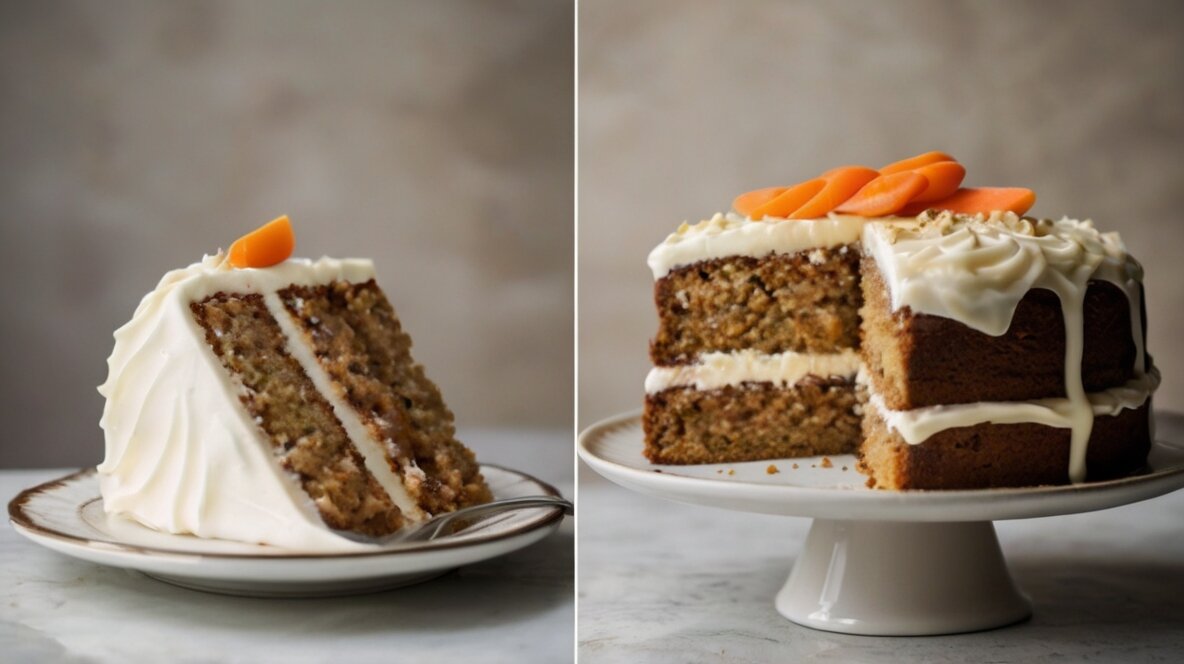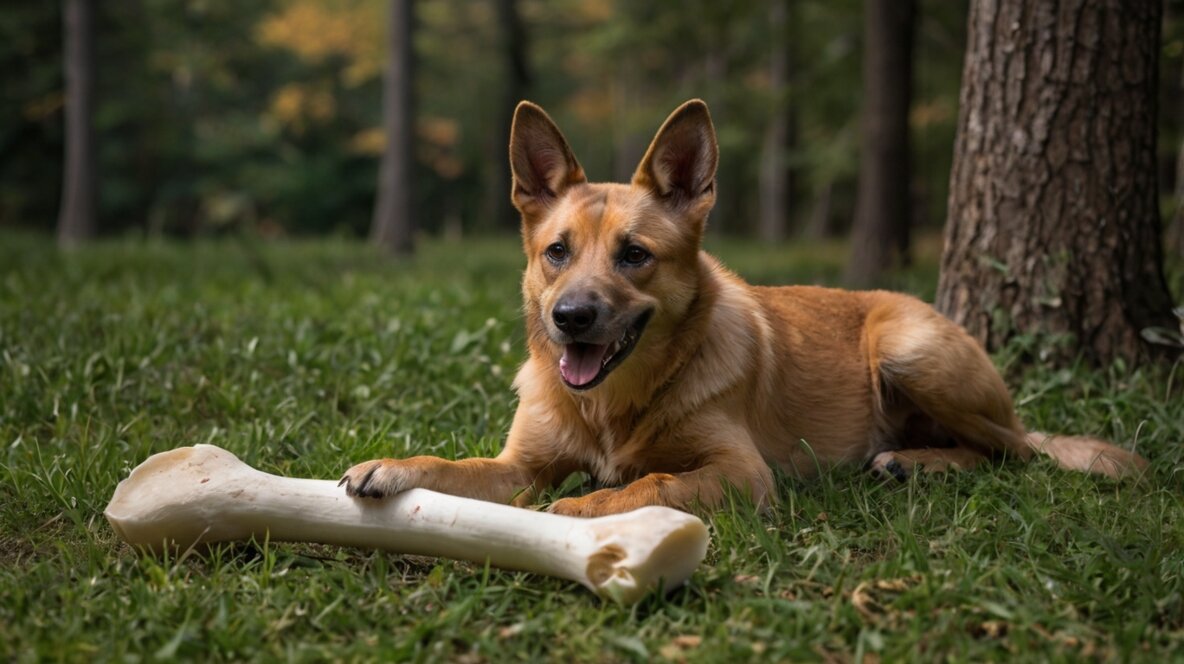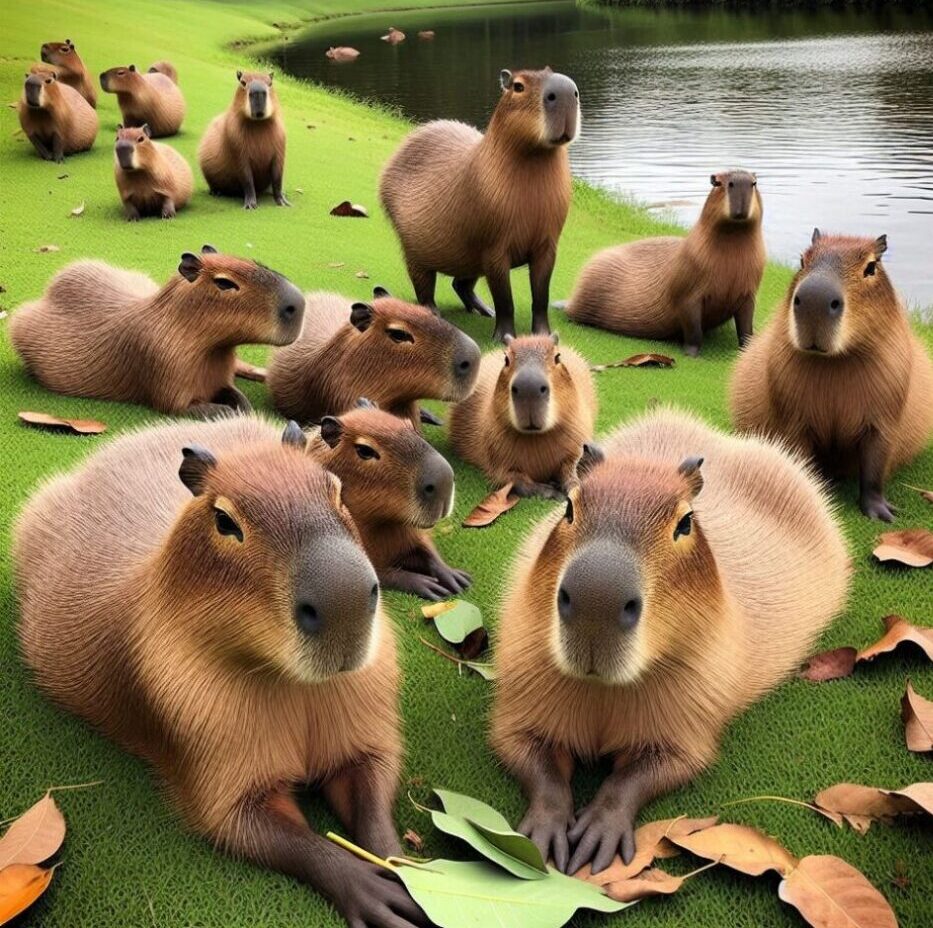Introduction
Can Cats eat carrot cake? Cats are notorious for their curiosity, especially when it comes to what their humans are eating. If you’ve ever found your feline friend eyeing your dessert, you might wonder if it’s safe to share a bite.
One common question that cat owners ask is whether they can feed their cat carrot cake. This guide will delve into the topic, offering insights into feline dietary needs, the risks of sharing human food with your cat, and safe alternatives for treating your furry companion.
Table of Contents
Understanding Feline Dietary Needs
Before we dive into whether carrot cake is a suitable treat for your cat, it’s essential to understand what cats need nutritionally. Cats are obligate carnivores, meaning their diet should primarily consist of meat. Unlike omnivores (like us), cats have specific dietary needs that don’t include many of the ingredients found in typical human foods.
What Do Cats Typically Eat?
Cats thrive on a diet rich in protein, with some healthy fats and a minimal amount of carbohydrates. Their digestive systems are designed to process animal proteins, making foods like fish, chicken, and beef ideal for them.
Nutritional Requirements for Cats
Cats need taurine, an essential amino acid, along with other nutrients such as arginine, arachidonic acid, and vitamins A and D, which they can’t produce in sufficient quantities on their own. These are primarily found in animal tissues, which underscores the importance of meat in their diet.
Foods That Are Generally Safe for Cats
While cats should primarily eat meat, certain vegetables like carrots can be safe in moderation. However, it’s crucial to ensure these foods are prepared correctly—usually steamed or pureed without added seasonings.
What is Carrot Cake?
Carrot cake is a popular dessert made with ingredients like flour, sugar, eggs, carrots, spices (like cinnamon), and often topped with cream cheese frosting. While it might seem like a healthier cake option due to the inclusion of carrots, it’s still a sugary treat that’s not suitable for every palate—especially not for cats.
Basic Ingredients of Carrot Cake
Carrots: Provide some nutritional value but not essential for cats.
Sugar: Unnecessary and potentially harmful to cats.
Flour: A carbohydrate that cats don’t need in their diet.
Eggs: Safe for cats, but not in the form of cake.
Spices (e.g., cinnamon, nutmeg): Can be harmful to cats.

Nutritional Profile of Carrot Cake
While carrot cake offers some vitamins and minerals for humans, its sugar and fat content make it an unhealthy choice for your cat. Carrots themselves are rich in beta-carotene, which is beneficial for humans but unnecessary for cats, who convert beta-carotene into vitamin A inefficiently.
Can Cats Eat Carrots?“Foods cats can and can’t eat”
Carrots, in their simplest form, can be a safe treat for cats. They’re not toxic and can offer a crunch that some cats might enjoy. However, carrots should be given in moderation and prepared without any seasonings or additives.
Nutritional Benefits of Carrots for Cats
Carrots are a good source of fiber, vitamin K, potassium, and antioxidants. While cats don’t require these in their diet, small amounts can provide a healthy, low-calorie snack.
How to Safely Offer Carrots to Cats
If you want to offer your cat carrots,”Safe treats for cats” make sure they’re cooked and cut into small, manageable pieces. Raw carrots can be a choking hazard and may be difficult for your cat to digest.
Is Cake Safe for Cats?
While carrots may be safe, the same cannot be said for cake. Most cakes, including carrot cake, contain ingredients that are unsuitable and even dangerous for cats.
Common Ingredients in Cake and Their Effects on Cats
- Sugar: Can lead to obesity, diabetes, and dental issues in cats.
- Spices: Ingredients like cinnamon and nutmeg can be toxic to cats, causing digestive distress or more severe health problems.
- Flour: While not toxic, it offers no nutritional benefits for cats and can contribute to weight gain.
- Cream Cheese: High in fat, which can lead to pancreatitis in cats.
Sugar and Spice: A Dangerous Mix for Cats
Even a small amount of cake can cause significant harm. The high sugar content is particularly problematic, as cats lack the digestive enzymes to process it efficiently. Spices, “Toxic foods for pets” which are common in carrot cake, can also cause toxicity.
Potential Risks of Feeding Carrot Cake to Cats
Feeding carrot cake to your cat can lead to a host of health issues, some of which can be serious.
Sugar and Cats: Why It’s a Bad Idea
Cats don’t need sugar in their diet, and consuming it can lead to immediate issues like vomiting and diarrhea, as well as long-term health problems such as obesity and diabetes.
Harmful Ingredients in Carrot Cake
While the carrots themselves might be safe, many other common ingredients in carrot cake can be harmful:
The Danger of Raisins and Nuts
Raisins are highly toxic to cats and can cause kidney failure even in small amounts. Nuts, particularly macadamia nuts, can also be harmful, leading to symptoms like lethargy, vomiting, and hyperthermia.
The Problem with Cream Cheese Frosting
Cream cheese frosting is high in fat, which can be difficult for cats to digest and may lead to pancreatitis, a serious condition that requires veterinary care.
Potential for Allergies
Cats can develop allergies to various ingredients, and the complexity of carrot cake’s ingredient list increases the risk of an allergic reaction.
Why Cats Should Avoid Human Desserts
Cats and human desserts don’t mix. Beyond the immediate risks, there are several long-term consequences of feeding your cat treats like carrot cake.
Digestive Issues Linked to Human Foods
Human desserts can cause significant digestive problems for cats, including diarrhea, vomiting, and bloating. Cats’ digestive systems are not equipped to handle rich, sugary foods, which can lead to chronic gastrointestinal issues.
The Risk of Obesity and Diabetes in Cats
Feeding your cat sugary treats can quickly lead to weight gain and the development of diabetes, a condition that requires lifelong management. Obesity in cats is also linked to a shorter lifespan and a decreased quality of life.
Behavioral Impacts of Feeding Cats Human Food
Regularly giving your cat human food can lead to begging behavior and an increased interest in food that is harmful to them. This can make it difficult to manage their diet and maintain their health.
Signs Your Cat Ate Something They Shouldn’t
Cats are notorious for getting into things they shouldn’t. “Foods cats can and can’t eat” If your cat sneaks a bite of carrot cake, here’s what you need to look out for.
Symptoms of Food Poisoning in Cats
If your cat eats something toxic, they might exhibit symptoms such as vomiting, diarrhea, lethargy, loss of appetite, and in severe cases, seizures or difficulty breathing.
What to Do If Your Cat Eats Carrot Cake
If you suspect your cat has eaten carrot cake, especially if it contains harmful ingredients like raisins or nuts, it’s essential to contact your veterinarian immediately. Provide details about what and how much your cat ate to get the best advice on how to proceed.
Healthy Treat Alternatives for Cats
While carrot cake is off the menu, there are plenty of other options that can satisfy your cat’s desire for a treat.”Cat health and nutrition”
Safe and Nutritious Treat Options
Consider offering your cat treats that are specifically designed for their dietary needs. High-quality commercial cat treats or simple, unseasoned cooked meats are great options.
DIY Cat Treat Recipes
If you enjoy making homemade treats, there are many safe and simple recipes you can try.
Simple Carrot-Based Cat Treat Recipe
For a carrot-based treat, consider baking a mixture of pureed carrots, chicken broth, and a small amount of oat flour into bite-sized treats.
Other Vegetable-Based Treats
Other vegetables like pumpkin or peas can also be used to create healthy, cat-friendly snacks.
Understanding and Preventing Feline Pica
If your cat frequently tries to eat non-food items or things they shouldn’t, they might be exhibiting signs of pica.
What is Pica in Cats?
Pica is a condition where cats eat non-food items. It can be caused by various factors, including nutritional deficiencies, boredom, or stress.
How to Manage and Prevent Pica
Ensure your cat is receiving a balanced diet and enough mental and physical stimulation. If pica persists, consult your veterinarian for further advice.
Training Your Cat to Avoid Human Food
Preventing your cat from developing a taste for human food is key to maintaining their health.
Tips for Keeping Your Cat Away from the Table
- Keep human food out of reach.
- Train your cat to stay off counters and tables.
- Use positive reinforcement to reward good behavior.
Positive Reinforcement Techniques
Reward your cat with their own treats when they ignore your food, reinforcing the idea that their treats are better than yours.
What to Do If Your Cat Eats Carrot Cake
If your cat manages to get into the carrot cake, don’t panic—but do act quickly.
Immediate Steps to Take
- Remove any remaining cake from your cat’s reach.
- Monitor your cat for any signs of distress.
- Contact your veterinarian for advice.
When to Consult a Veterinarian
If your cat shows any symptoms of illness after eating carrot cake, especially if it contains toxic ingredients like raisins or nuts, contact your veterinarian immediately.
Conclusion
Feeding your cat carrot cake, or any human dessert for that matter, is not advisable. While the occasional nibble of carrot might be safe, the other ingredients in carrot cake pose significant risks to your cat’s health. Instead, stick to cat-friendly treats that are specifically designed to meet their nutritional needs. By doing so, you’ll ensure your feline friend stays healthy and happy.
Final FAQs
Can Carrot Cake Be Modified for Cats? It’s best to avoid modifying human desserts for cats. Instead, focus on creating treats specifically for them.
Is It Ever Safe to Share Human Food with Cats? Some plain, cooked meats and vegetables can be safe in small amounts, but it’s important to avoid foods with added spices or ingredients toxic to cats.
What Are Some Common Human Foods That Are Safe for Cats? Cooked chicken, turkey, and certain vegetables like peas and carrots (in moderation) are generally safe for cats.
By understanding the dietary needs of your cat and the risks associated with feeding them human food, you can make informed choices that support their health and well-being.



